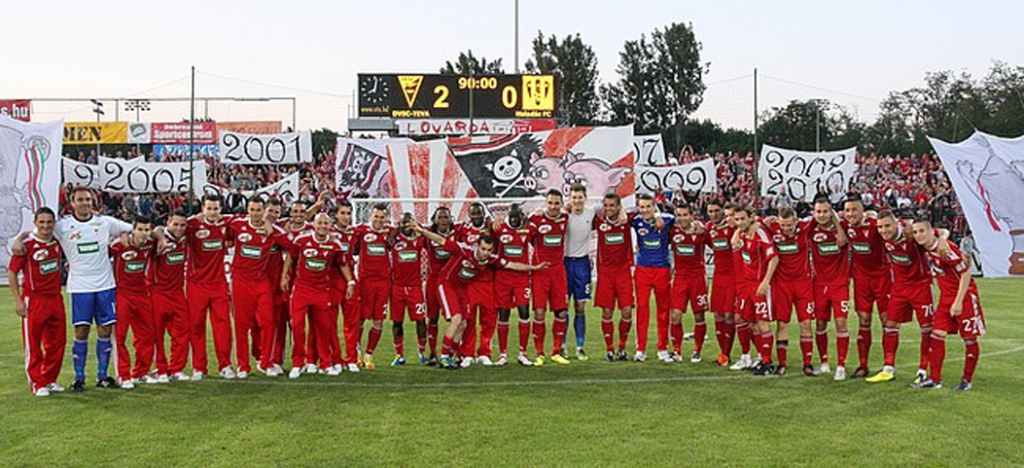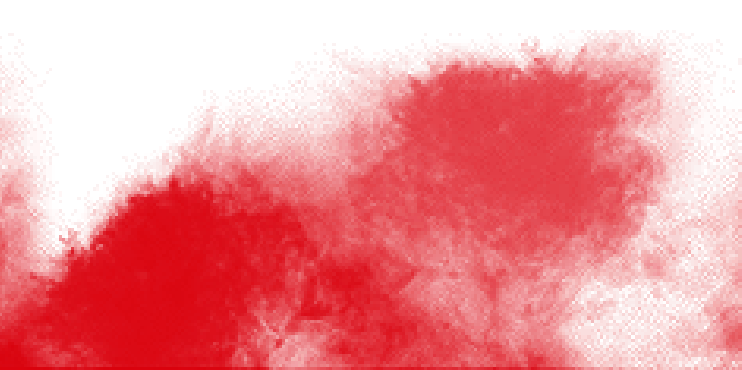

The predecessor of DVSC was the Egyetértés Football Club, founded on 12 March, 1902. Until 1920, only MÁV workmen were allowed to play football in its ranks, and they initially played their matches on the ground north of the area known as the Falóger, strictly after working hours. During their first matches, they were already dressed in red and white.
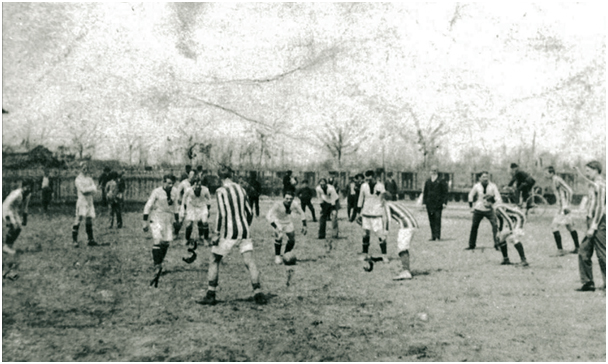
In 1908, the club received its first silk flag from MÁV, with red and white fields showing a lance and a winged wheel and the name “Egyetértés” (Concord) on it. Until 1925, red and white were the official colours of the club and later it was named Vasutas Sport Club.
The early years:
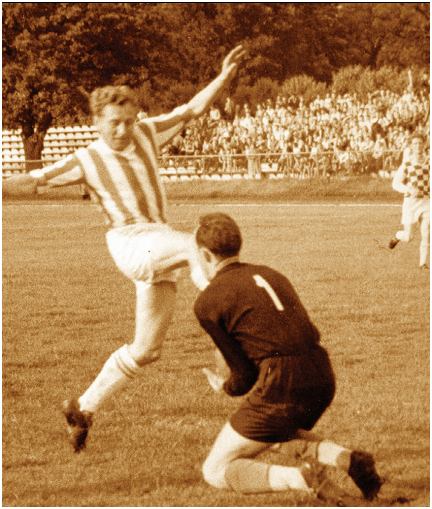
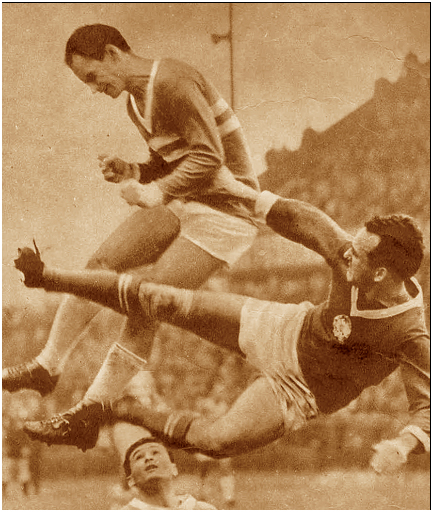
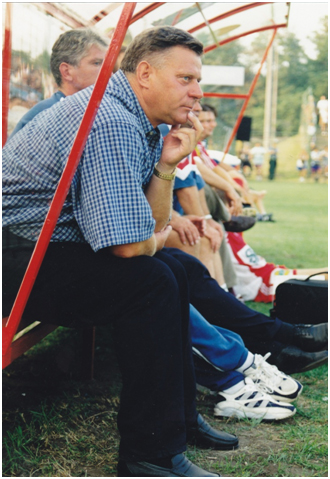
A Debreceni VSC 2003. és 2012. között megtett útját érmekkel, trófeákkal borították be a labdarúgók, nem akadt esztendő, amikor ne szereztek volna valamilyen medaliont. Íme, a kincstári kivonat:
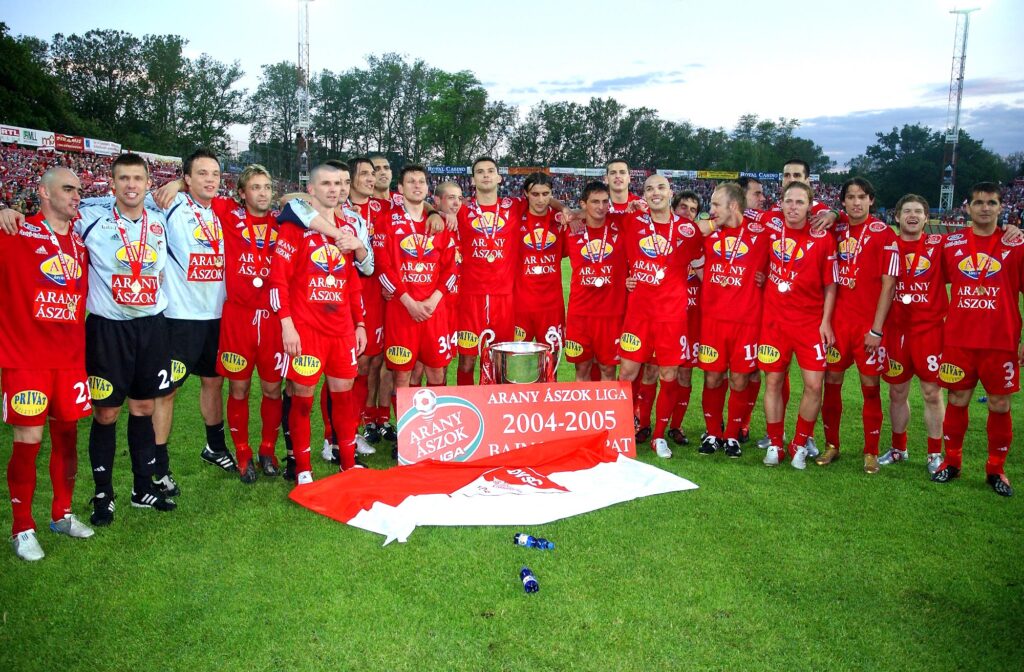
Source: Baj-nok-csa-pat! by Tamás Dénes and Mihály Sándor
DVSC was founded on March 12, 1902. It was originally known as the Egyetértés Futball Club but during the summer of 1912, it became independent and the Debreceni Vasutas Sport Club was established. Over the past century, the team won 7 championship gold medals (2005, 2006, 2007, 2009, 2010, 2012, 2014), 6 cup titles and 5 Super Cup titles.
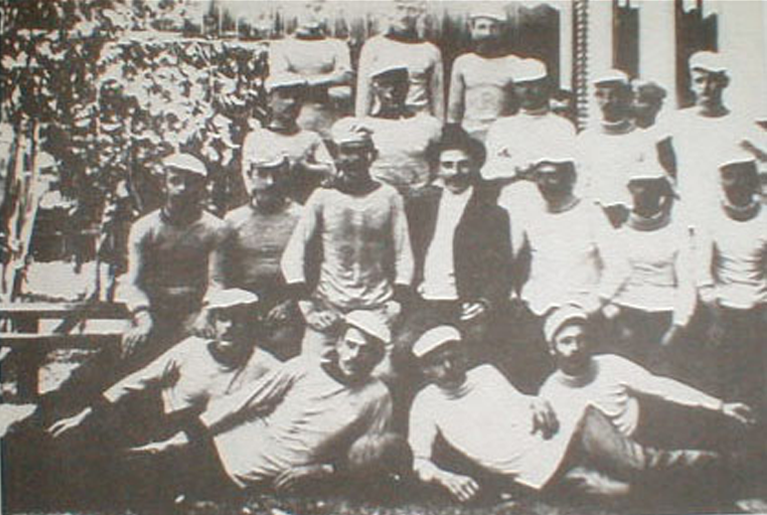
The team has participated in several international competitions and some of the players were part of the national team as well.
What concerns the beginnings, DVSC participated in their first organized championship in the Northern District of the Military Championship in 1916-1917 and 1917-1918. Both times, they were defeated by Diósgyőri VTK. The team of Diósgyőr had to play only against four teams (DVTK, Miskolci MTE, MVSC, and DVSC). In fact, Debrecen cancelled some of their matches due to travel difficulties.
With the end of World War I, there was no longer a need for Military Championships, and in 1920, regional leagues were established for rural clubs. DVSC became the champion of the Eastern District (KLASZ) in 1921, 1923, 1924, 1925, 1926, and 1938, and won the NB II Mátyás group in 1943.
The start of professionalism in 1926 did not bode well for the railway club. Within a few months, the Bocskai FC was formed in Debrecen, consisting of players from DVSC, DKASE, and DTE. The aforementioned team was Debrecen’s best football club for a decade and a half, winning the cup in 1930 and finishing third in the 1933-34 championship, while DVSC played only in lower divisions.
Around 1940, the rigid separation between professional and amateur football ceased, and due to financial reasons, the Bocskai team dissolved. For this reason, DVSC became the city’s top football team again and did everything to reach the first division. This finally happened in the 1942-43 championship but it did not last long as four years later, the first relegation in the club’s history occurred, which was followed by seven more until 1993. In fact, in 1967, DVSC experienced its biggest failure by dropping down to the third division.
Although the founders chose red and white as colours of the team, which is still in use today, the colors of the jerseys worn by the players changed several times in the early decades: in 1925, when the Debreceni MÁV Testgyakorlók Köre merged into the Vasutas, the colors were green and white, and from 1937, the club wore purple and white. After World War II, Vasutas returned to red and white, which can now be considered as permanent colours of the team. The exception was during the DMTE-DVSC era, when Debrecen’s “united” team sported yellow and blue.
The team of Debrecen was also subject to the socialist sports policy of the decades following World War II: name changes became common again, following the pattern of the former Soviet sports federations. The club’s name was Debreceni Vasutas Sport Egyesület in 1948-49, Debreceni Lokomotív from 1949 to 1955 (during which time the team’s nickname, “Loki,” was born), Debreceni Törekvés in 1955-56, and Debreceni Vasutas SC from 1957 to 1979.
1979 was the year of the aforementioned fusion in the city, when the Debreceni Munkás Vasutas Sport Club was born from the merge of Debreceni Vasutas and Debreceni MTE. DMVSC separated on its 10th birthday, and since then, Debreceni Vasutas Sport Club has been the official name of the club.
The real success of Loki started in 1993. The team was promoted to the top division and one year later, with the best coach in Debrecen’s history, Lajos Garamvölgyi, they won the bronze medal in the championship and also won the Hungarian Cup in 1999.
In 2001, a lot happened in the life of Loki. On March 18, János Pajkos took over as coach of the team.
The team won the Hungarian Cup later that year, but the season wasn’t too successful for them as they were relegated from the top league.
However, DVSC managed to stay in the first division with the withdrawal of BKV Előre. In 2001, Gábor Szima, a successful businessman, became the majority owner of the club. Essentially, after his involvement, the problems in the life of the club started to cease. He wanted to show that it is possible to successfully operate a football club in today’s Hungary without scandals and bankruptcies. What is needed for this? A stable economic background, a lot of hard work and making consecutive good decisions. He was aware of the fact that an investor in Hungarian football cannot take money out of the sport for many years if they want to achieve results. On January 15, 2002, Sándor Szilágyi joined the club, who did a lot for the success of Loki as the CEO of the club.
On the international stage, the red and white team could test their skills against teams such as Wolfsburg and Bordeaux, with the latter being defeated at home 3-1 in a sensational match by the Pajkos team after an unlucky away game.
Under the leadership of Lázár Szentes, the team finished third in 2003 and 2004, and also won the silver medal in the Hungarian Cup in 2003 after losing to Ferencváros in the final. Of course, we also have to mention the international cup run of the team in 2003/2004. The team reached the third round during the spring season, which is something that no Hungarian team had done in twenty years. However, they were stopped by Brugge, and after losing 1-0 away, Sándor Tamás’ team managed to achieve a goalless draw at home.
In 2005, DVSC achieved the biggest success in its history, fulfilling the dreams of many Loki supporters: they became Hungarian champions. The team achieved this result under the leadership of Attila Supka, the coach of the team who replaced Szentes within that season. A year later, the coach led his team back to the top. In 2007, under the leadership of the Czech Miroslav Beránek, DVSC won another championship, making a historic achievement in sport as no other rural team had finished at the top three times in a row before. The series was interrupted in 2008, as Loki finished second behind MTK, but the club still won its third cup title that year.
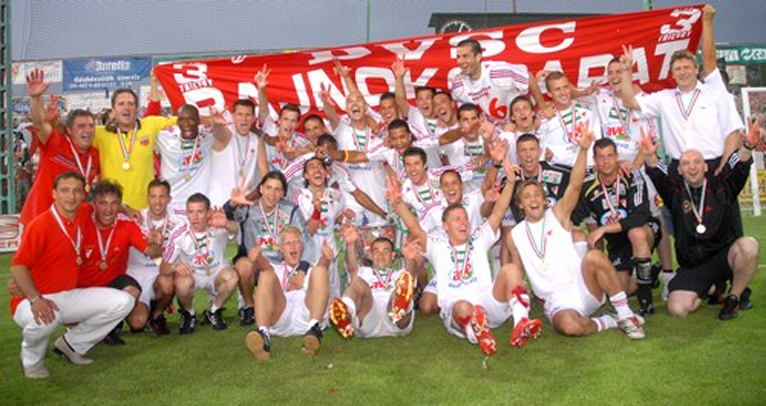
A year later, DVSC reclaimed their spot on the championship throne, and nobody suspected yet what a miracle awaited the team soon. Led by András Herczeg, the Loki successfully passed through three Champions League qualifiers (winning five out of six matches) and made it to the group stage. The team from Hajdú-Bihar clashed with Liverpool, Fiorentina, and Lyon, and despite losing all the games, they played very good and enjoyable matches. The home Champions League matches had to be held at Puskás Stadium, where Dombi and the others played in front 42,000 spectators, so it was a full house. The red and white team mobilized football-loving society, and fans from all over the country came to watch the matches. András Herczeg became the most successful coach in the club’s history, as since taking over in November 2007, the team won one silver and one gold championship, a Hungarian Cup, and a Super Cup victory, plus the sensational international performance mentioned above.
2010 was one of the most successful years in the life of the club, still under the leadership of András Herczeg. The team won every competition at home (championship, Hungarian Cup, League Cup), and also made it to the Europa League group stage, where they played against Metalist Kharkiv, PSV, and Sampdoria. Loki finished last in the group, but almost caused a surprise in Kharkiv and beat the Italians 2-0 at home.
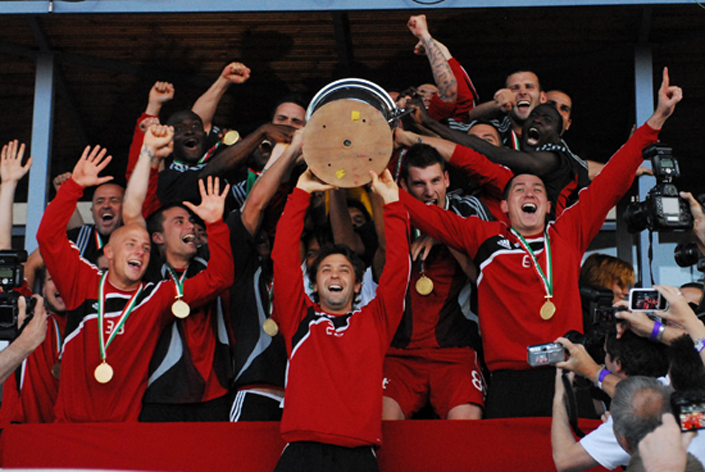
In 2012, under the leadership of Elemér Kondás, DVSC won the championship undefeated. This feat had never been achieved before by a provincial club, and among the clubs of Budapest, only BTC (1901, 1902), MTK (1914, 1918, 1936), FTC (1932), Újpest (1946), Honvéd (1952), and Vasas (1966) have managed to do so.
